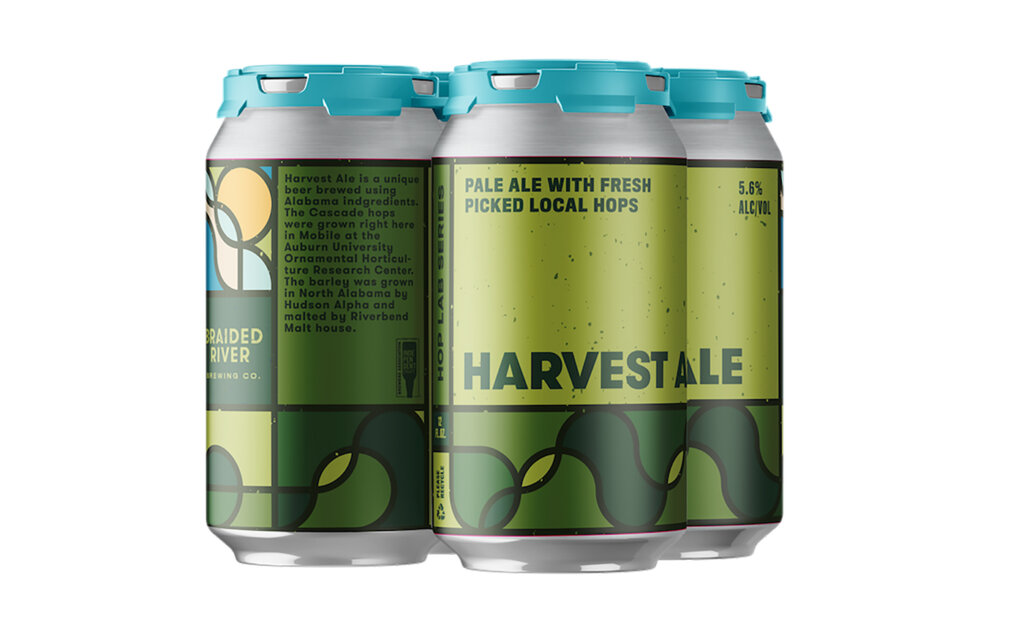
Craft-brew fans will now be able to purchase the first-ever beer brewed from Alabama-grown barley malt thanks to a state-wide project led by the HudsonAlpha Institute for Biotechnology. The collaboration included experts from HudsonAlpha, Auburn University, and Alabama A&M University, and met an exciting milestone as Braided River Brewing Company in Mobile recently released a new beer containing barley malt sourced in Alabama.
“We brewed a fresh and floral pale ale, which we call Harvest Ale,” said David Nelson, brewmaster at Braided River. “The malt tastes great and is of high quality as any other malt we’ve ever used. Most of our malt is usually sourced from the Upper Midwest.”
Craft breweries are big business in the United States. According to the Brewer’s Association, more than 9,500 breweries were operating across the U.S. in 2022. Breweries in the eastern U.S. have traditionally imported essential ingredients like barley and hops because they grow best in the Midwest and Pacific Northwest.
This is changing in Alabama, thanks to HudsonAlpha and this Alabama Department of Economic and Community Affairs (ADECA)-funded project.
“HudsonAlpha initiated this project after seeing the opportunity for farmers, brewers, businesses, and scientists to capture more of the value chain for Alabama’s economy,” said Jeremy Schmutz, HudsonAlpha faculty investigator and project lead.
Schmutz brought together a collaborative team of experts from HudsonAlpha (Dr. Josh Clevenger and Dr. Alex Harkess), Auburn (Henry Jordan and Dr. Wendiam Sawadgo), and Alabama A&M (Dr. Ernst Cebert and Dr. Xianyan Kuang). In all, the group planted more than 50 barley varieties at field stations across Alabama in the fall of 2021. The best varieties were planted in one of four larger field trials in the fall of 2022 at Martin Farms in Courtland.
“We harvested 30,000 pounds of barley from an eight-acre field trial in north Alabama,” said barley project manager Kaitlyn Williams of HudsonAlpha. “The barley developed well and had low disease and insect pressure. It met the protein levels and the toxicity levels required by the industry. We sent it to Riverbend Malting in Asheville, N.C., where they confirmed it met the malting standard and had a great color and germination rate. Everything fell into place to start distributing the malt.”
The local barley malt has piqued the interest of many southeastern breweries, with a growing waiting list, including breweries in Huntsville, Birmingham, and Mobile.
“We certainly like to support our local economy,” Nelson said. “We also recognize that using in-state ingredients like HudsonAlpha’s barley lessens our environmental impact, which is very important to our company. Braided River was founded on the banks of the Mobile-Tensaw River Delta, known as “American’s Amazon” for its biodiversity, and we take our duty to preserve this unique natural resource seriously. We hope to celebrate it and help preserve it—while connecting with each other over delicious beer—for generations to come.”
The Alabama barley benefits more than just craft breweries. If farmers have equipment for wheat, which is a standard row crop in Alabama, they already have what is approved for barley. With high yields and strong demand, farmers will gain another crop to put into their yearly rotation.
“It’s rewarding to see a local guy making local products for local folks,” Williams said. “The whole barley project gives back in many different ways. Everyone benefits from that local product, whether you’re enjoying a nice beer, profiting from the beer, or incorporating a new, lucrative crop into your farm’s rotation.”
If you’re in the Mobile area and want to try the Braided River Harvest Ale a try, here’s one more reason: it contains more local ingredients than the Alabama barley.
“Harvest Ale is extra special because it also incorporates Alabama-grown hops,” Nelson said. “The Cascade hops are experimental, too, as hops typically thrive in the Pacific Northwest. But these were grown a few miles from our brewery, at the Auburn University Ornamental Horticulture Research Center in Mobile.”
The Alabama Research and Development Enhancement Fund supported the research reported here. The content is solely the responsibility of the authors and does not necessarily represent the official views of the State of Alabama.



